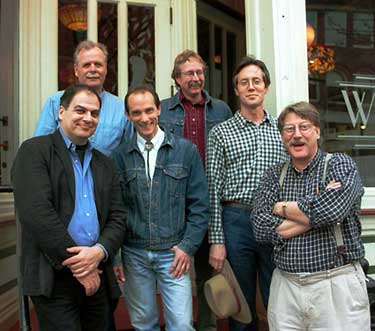In 1970s Ann Arbor, Mike Smith and The Cadillac Cowboys performed the musical soundtrack to a phenomenon known as the Friday 5:30-8 p.m. happy hour show at Mr. Flood’s Party, a music bar on Liberty Street.

The Flood’s scene included mobs of noisy, happy office workers with loosened ties pressing shoulders with hippies in denim shirts, as drink flowed and the friendly country-swing sounds of The Cadillac Cowboys got the weekend started right.
Flood’s now is part of Ann Arbor legend. But the Cowboys live on.
Alan Pagliere, the group’s pedal steel guitarist since 1978 and U-M Digital Library programmer, will be back onstage for the band’s annual show at the Ann Arbor Summer Festival (AASF)-Top of the Park outdoor concert series at 9:45 p.m. June 24.
The AASF show is one of only a handful the group performs these days. After years playing local clubs, they’ve earned a bit of a break.
Born in New York City, Pagliere lived briefly in his parents’ native Argentina before returning to the United States. “When Juan Perón came to power bringing fascism to the country, my parents left, and in a hurry I might add,” he says.
“I lived there until I was about 4 or 5 years old. I guess I was speaking Spanish when I hit kindergarten. My parents always spoke Spanish to each other and usually English to my brother, sister and me, with Spanish all around when family visits here.”
Steel guitar isn’t Pagliere’s only passion. He once kept bees and also tries brewing. He even took a job as brew master for a short-lived Lansing brew-pub.
But it’s not the bees or brewing that might get Pagliere recognized on the streets around the Hatcher Graduate Library where he works—it’s the steel guitar. The instrument’s sweet, flowing sound is prominent on classics including “Teach Your Children” by Crosby, Stills and Nash and “Old Man” by Neil Young.
“I first heard it in high school,” Pagliere recalls. “I had started playing some folk guitar and bluegrass banjo. I started listening to what little country radio there was on Long Island around 1970-73. When I heard the steel, I was fascinated by the fact that one instrument could make such different sounds. Sometimes, individual notes in the chords would move and blend; other times notes were picked fast.
“I was also listening to other bands more popular with people my age that started to incorporate the steel: Commander Cody, Jerry Garcia with New Riders of the Purple Sage, etc. In 1975, I bought my first pedal steel.”
In graduate school in Ann Arbor, he hooked up with The Cadillac Cowboys. They also performed in a slightly different lineup as The Country Volunteers. Pagliere played with both.
“When the band seems to be particularly in synch, an energy is created and maintained, and the audience seems to really be ‘getting it,'” he says.
One of his fondest playing memories is with The Lentil Soup Boys, the band he played in as an undergrad at Rutgers University. “We were playing at Cape May at the southern tip of New Jersey, for a bunch of elderly people. They really appreciated that we were young people that played swing music from the 40s; they were dancing.”
Pagliere recently has been moved by the New Orleans brass bands he heard at that city’s annual jazz festival in late April-early May. His current music favorites include the smaller combo swing groups that his father loved, postwar bop and jazz. “The harmony is more interesting in that music than it is with country; they’re more out there in their improvisation,” he says
Improvisation is good in jazz, but when it comes to home brewing, Pagliere prefers a different approach: “I like to brew to a specific, recognized style, so that I can test my skills.” He won a gold medal in the Pilsner category in the 1994 American Homebrewers Association national competition.
On beekeeping, he says, “Honeybees are fascinating animals. The hive has a personality, has a life cycle, reproduces, makes decisions, etc. It’s also a way to keep alive an activity that in the past everyone did for themselves, like home baking of bread; home brewing.”

